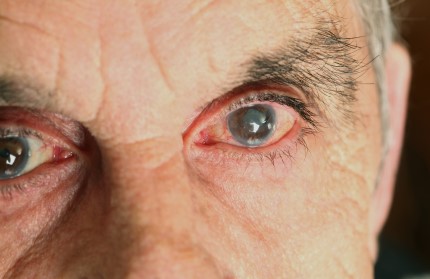According to the American College of Allergy, Asthma, and Immunology, 50 million Americans have seasonal allergies. Nearly 30 percent of adults and 40 percent of children experience uncomfortable symptoms like sneezing, sniffling, and itchy, red, and watery eyes. If you suffer from allergies, Eyesthetica hopes this post will be helpful.
What Causes Eye Allergies?
An allergy is the body’s immune system response to something in the environment (known as an “allergen”) that does not usually bother most people. When the allergen makes contact with antibodies attached to the mast cells in the eyes, those cells respond by releasing histamine and other substances and chemicals that cause the blood vessels in the eyes to leak, and the eyes to redden, itch and water.
Eye allergies can be triggered by outdoor allergens like pollen, weeds, and trees, indoor allergens like pet dander, dust, and mold, and irritants like cigarette smoke or perfume. Some people have allergic reactions to cosmetics, lotions, or even certain eye drops.
Tips to Soothe Red, Itchy Eyes
Firstly, try to limit your exposure to known allergens. If you know you are sensitive to pollen, stay indoors on days when the pollen count is high, keep the windows closed and use your air conditioner to filter the air. Avoid using a window fan that may bring pollen and mold into your house. If you go outside, wear wraparound glasses or sunglasses to protect your eyes from weeds and pollen.
Look for mattresses and linens that are labeled “mite-proof.” Wash bed linens frequently in hot water. Keep the humidity in your home low to limit mold exposure. Use a dehumidifier in damp, humid spots like the basement. When you clean your floors, use a damp rag or a mop instead of sweeping.
Use eye drops to relieve itchy, dry, red eyes caused by allergies. You can start with over-the-counter options, such as Ketotifen, to be used twice a day; if those don’t work, speak to an eye doctor about prescription drops. Avoid over-the-counter drops that are advertised as “gets the red out,” as these have chemicals that temporarily constrict blood vessels in the eyes but can actually cause more redness and irritation long-term.
Oral medications such as decongestants, antihistamines, and corticosteroids can help relieve eye allergies. Antihistamines block the attachment of histamine, a substance that dilates blood vessels and makes the walls of the blood vessels permeable, causing symptoms like itchy eyes and a runny nose. Decongestants can shrink blood vessels on the eyes to relieve red eyes. Talk to your primary care physician or allergist to find the most effective option.
If possible, cut down on your contact lens wear. The surface of your contacts can attract airborne allergens. Wear eyeglasses or switch to disposable, single-use contacts to avoid the build-up of allergens and other debris.
And lastly, avoid rubbing your eyes, which causes more irritation.
Contact the Eyesthetica Team
For more information about eye allergies and how to soothe irritated eyes, please contact the team at Eyesthetica. Call us today at (213) 451-6824.


